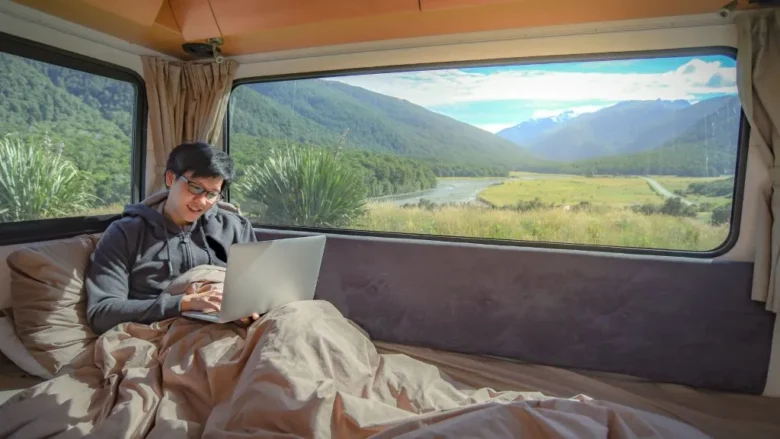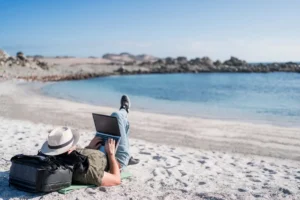The digital nomad lifestyle is popular for its freedom, flexibility, and the opportunity to experience exciting adventures while working online. However, behind all those beautiful sunsets on the beach and laptops lies a challenge: balancing important work with the joy of travel. Too much work can negate the value of travel; too much adventure can lead to missing deadlines. Finding this perfect balance is essential for sustaining this lifestyle long-term without burning out or losing money. With more and more professionals working from home, learning how to combine the two is not just a beneficial idea but a necessity.
In this article, we explore research- and experience-based strategies that can help digital nomads truly succeed, going beyond conventional advice. You’ll find tips on maintaining mental discipline, planning, and adapting your work style to your location, so you can enjoy your travels while maintaining your professional edge. Let’s talk about how to find the perfect balance: productive work and fun.
Set Clear Intentions for Each Destination:
Make sure you know what you want to do in each location. Digital nomads often make the mistake of treating every place they visit as a vacation, which can hinder their productivity. On your first day, you’ll want to see every street, walk every route, and try every cuisine, but such activities can quickly distract you from your work. To truly combine work and adventure, you need to make a plan first. Before arriving in a new place, make a list of your priorities, including what you work on and what you want to do for fun.
For example, if you’re traveling to Chiang Mai for a month, set weekly work goals, followed by cultural or recreational goals like visiting temples, climbing Doi Suthep, or taking a Thai cooking class. This way, you won’t feel guilty or exhausted by the choices you make about how to spend your time. According to research from the University of California, setting goals can increase your productivity by up to two. You base your choices on what you want to do by setting goals first. This approach is productive while satisfying your urge to travel.
Time Block Your Day Around Adventure Windows:
For digital nomads, time is paramount. If you don’t manage it, it will handle you. Time blocking—dividing your day into blocks to complete different tasks—is a very effective way to get things done. You can set “adventure time blocks” in your calendar, which is incredibly useful for digital nomads. For example, you could work hard from 7:00 AM to 12:00 PM and then free up the afternoon for surfing, sightseeing, or a hike in the mountains. This way, you can discover things while meeting deadlines.
Neuroscience confirms this: working during focused time can make your brain more productive and reduce fatigue. You can use tools like Google Calendar, Notion, or Sunsama to track and stick to your time blocks. The key is consistency. Once your brain adapts to this pattern, you can easily switch between focus and relaxation. Time planning can help you go from a chaotic day to a balanced one. It helps you stay organized without sacrificing your freedom.
Develop a Consistent Work Habit:
Frequent travelers may find routine monotonous, but for digital nomads, it serves as a valuable tool. ily work routine, even for the smallest things, can help you stay productive wherever you are. The routine could be as simple as making coffee before logging in, writing in a notebook for five minutes, or reviewing your top three goals each morning. These signals alert your brain, enabling you to distinguish between play. Behavioral research indicates habits can help you get things done better and reduce stress.
The key is to carry these habits with you. Whether you’re in a beach house in Costa Rica or a coworking space in Berlin, your habits stick with you. They help you stay calm amidst the chaos. These consistent activities make it easier to get started, which in turn reduces procrastination and increases productivity. A regular morning routine is especially helpful because it helps you shift your thoughts to new territory.
Choose a Destination Based on Your Workload:
Not all environments are suitable for every work session. Some cities are perfect for getting work done, while others are perfect for relaxing. To balance work and adventure, make sure your destination aligns with your current workload. Are you embarking on a fresh project? Choose a quiet, affordable location with excellent internet and less activity, like Danang, Vietnam, or Bansko, Bulgaria. Want to take a break and reduce your weekly work hours? Consider busier cities like Barcelona or Cape Town, where adventure is always just around the corner.
This type of placement, known as “intentional camping,” allows digital nomads to maintain a balanced life without much effort. Research on remote work shows that the environment significantly impacts motivation and focus. When choosing your vacation destination, don’t just look at your Instagram feed. Please also take into account the season during which you are working. Such an approach will not only help you do better work but also make your adventure more meaningful and authentic. Work hard in an environment that allows you to focus, and then treat yourself to a trip where you feel good.
Disconnect to Reconnect With Purpose:
Overconnection is one of the biggest risks to a digital nomad’s happiness and productivity. When work emails follow you around during a sunset walk on the beach or in the woods, both work and adventure can feel awkward. Knowing when and how to unwind is crucial. Just like in the office, set clear work hours and boundaries. Use features like Do Not Disturb mode, app blockers, and even a second device to keep work and personal life separate.
Psychological research shows that true rest makes you more creative and better able to solve problems, ultimately boosting your productivity. More importantly, consciously unplugging allows you to fully immerse yourself in the present moment, whether you’re exploring local culture, meeting other travelers, or simply stepping away from your screen. Adventure is not a chance occurrence; it is a beneficial experience for your soul. Keep that zone safe. When you fully unplug in your spare time, you’ll remember why you chose the nomadic lifestyle in the first place.
Conclusion:
The biggest advantage of being a digital nomad is finding a meaningful career while traveling the world. But without a plan, it’s easy to lose your balance by working too much or engaging in unplanned activities. To be successful in the long run, you don’t have to choose between work and adventure. Instead, you need to find a way to combine both.
Set clear goals, use your time effectively, develop work habits that carry over into your travels, ensure your workspace aligns with your workload, and, most importantly, learn how to disconnect from work. It’s not just about getting things done; it’s also about finding joy. When you find this balance, you’re not just a digital nomad; you’re a successful digital nomad. The world isn’t just your office; it’s your playground and your haven. Make smart choices, act purposefully, and enjoy the journey between work and home.
FAQs:
1. How can digital nomads avoid overworking while traveling?
By maintaining clear work hours, using time management methods, and scheduling daily or weekly trips, you can avoid burnout and stay focused.
2. Is it possible to combine full-time work and travel?
Yes, but you need to be patient, maintain self-discipline, and choose a destination that aligns with your current work schedule and life goals.
3. How can you stay productive in a new location?
Create a convenient daily routine, stick to a consistent schedule, and use productivity tools and location-aware planning to reduce distractions.
4. Should I plan my travel around my work, or should I plan my work around my travel?
Plan your travel around your work needs to maintain a balance. Choose your destination based on project requirements and your availability.
5. How do you balance work and personal life?
Set aside time in your day for ‘adventurous moments,’ see exploration as a reward, and plan it like an important business meeting to ensure it runs smoothly.




